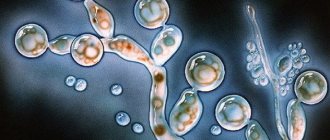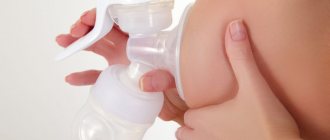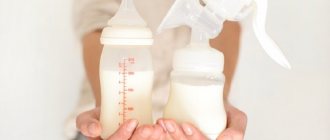Breastfeeding is beneficial for the child, because with the mother’s milk the child develops her immunity.
Sometimes situations arise when breastfeeding must be stopped. It is not always possible to stop lactation naturally, so you should use pills. You will read about in what cases it is necessary to stop the lactation process and what pills there are to stop lactation - a list and reviews - in this article.
Breastfeeding sometimes needs to be stopped not by choice, but due to circumstances. How to do it?
Signs of lactation involution
There are distinctive features of the moment when the body is ready to complete lactation, namely:
- Milk no longer fills the breasts and they remain soft all day.
- The appearance of the liquid is more reminiscent of colostrum than milk. This is due to an increase in the percentage of fat content and a decrease in lactose in the composition.
- The baby begins to suckle more actively at the mother's breast, because it is more difficult for him to get milk from it. He tries to feed himself, as he is accustomed to a certain amount of food. As a result, the mother has to transfer it to the other breast.
- The process of feeding causes not only fatigue, but also breast pain in the mother. After this, the woman feels a strong loss of strength.
To summarize, all the signs are reminiscent of the first weeks of pregnancy - irritability, weakness, drowsiness.
When the mother stops feeding the baby, about forty days may pass before the milk disappears. But the breasts do not always return to normal within this period. Each body is individual - it may take much longer for the breasts to return to their pre-pregnancy state and for the milk to completely drain.
There is a generally accepted opinion that it is necessary to breastfeed a child for at least six months - exactly until the moment when the toddler begins to be introduced to complementary foods.
On average, breastfeeding lasts up to six months, gradually removing feedings and introducing complementary foods.
Most often, there are two reasons why lactation is stopped - the mother’s desire and medical reasons. The latter case, in turn, is divided into unconditional and conditional indicators. An unconditional indicator necessarily requires termination, a conditional indicator only in special cases.
So, the absolute indicators:
- Late miscarriage or stillbirth.
- Maternal dependence on substances such as alcohol and drugs.
- Prescription of chemotherapy.
- Mom is HIV positive.
- Herpes of the breast or nipples.
- Tuberculosis in the active stage.
- Prescribed medications that prevent breastfeeding.
- The newborn has lactose intolerance.
And conditional indicators:
- The mother has a serious illness in one of her internal organs.
- Mastitis.
- Deviations in the development of a woman's breasts or nipples.
In what cases are tablets indicated?
For nursing mothers, a situation may arise that requires an abrupt stop in lactation. Most often, the problem arises against the background of medical indications of the mother or child:
- The presence of pathologies in the functioning of the female body. For example, lactation cannot be combined with surgery. In this case, the natural process of milk production should be stopped with medication. It is also unacceptable to combine taking certain medications with feeding the fetus, because in this case the risk of negative effects on the body and development of the baby increases. Only a specialist in this matter will be able to pass a verdict and suggest further actions to the woman.
- The baby's development occurs with a number of deviations, so the pediatrician advises switching to artificial feeding. The situation arises due to the presence of infections or other harmful external factors. In this case, it is necessary to place the baby in an incubator. It creates ideal conditions that will contribute to the rapid growth and proper recovery of the baby. In this case, the feeding procedure is carried out exclusively through a tube. If a woman does not have the opportunity to regularly express milk, then it makes sense to interrupt the process. Otherwise, the risk of developing breast diseases increases.
- The mother does not have the opportunity to constantly be near the baby. She goes to work or spends a long time studying. Such places do not have the appropriate sanitary and hygienic conditions necessary for proper expression of breast milk.
- Pathologies of the nipples and mammary glands.
- The mother needs to take strong medications.
- Purulent mastitis.
Ways to stop lactation
Conventionally, they can be divided into two types - natural cessation and artificial. With natural cessation, the baby is gradually weaned from the breast - a long process, since it is based on a reduction in the number of feedings.
The essence of the artificial method is that the woman takes medications or uses traditional medicine - however, they can be combined, but only if the components are compatible.
Note! After breastfeeding is complete, milk may still be released, just a few drops at a time. But if about six months pass and milk appears in the breasts, you should immediately contact a gynecologist to rule out the appearance of the disease.
Let's look at a few ways.
Abrupt weaning of a child from the breast
This method cannot be called effective or even safe. Typically, those who decide to stop breastfeeding do not want to wait long, and they try to abruptly wean the baby off the breast.

Neither psychologists nor pediatricians recommend abrupt weaning
They suggest separating the baby and mother for three to seven days, so as not to feed during this time. This is not just a stressful situation for the mother, but also and even more stressful for the child. This is a truly cruel method; pediatricians do not recommend its use.
Moreover, problems arise not only for the child (fear of losing his mother), but also for the woman - after all, milk is still coming in. It stretches the chest and causes pain. To calm them down, some women use an elastic bandage or wear a tight bra, but this increases the risk of lactostasis or mastitis.
This method is rarely beneficial. Along with weaning, compresses or wraps made from camphor oil or even cabbage leaves are used. They also use herbal infusions and tablets.
Reducing the number of feedings
It is the most natural way, and also completely safe. It is based on the fact that the less often the baby is put to the breast (and therefore the less it is stimulated), the less milk is produced.

For gradual weaning, you should start by replacing one feeding with complementary foods.
Over time, the woman feels that milk comes in less volume, and gradually stops appearing altogether. This method is not dangerous for the child, because he does not feel stress.
How to start the process, tips:
- Remove one feeding, preferably at night. Two weeks will pass, the child will get used to it - at this moment remove another one. Again, wait two weeks, and again remove feeding, and so on until only evening feeding remains. Of course, use complementary foods or formula instead of breastfeeding. Take the evening feeding last.
- You can also change the time or place of feeding. For example, you feed your baby in the bedroom, but this time you don’t go there. You can involve your dad or relatives in the process. Now one of them can go, for example, into the kitchen and give baby food instead of breast milk.
- Even if you suffer from breast fullness, do not express milk too often, as this will not be beneficial. You will stimulate your breasts again, and milk will continue to appear.
- If unusual density is felt in the mammary glands and the body temperature has increased, you need to express the milk completely. If a day passes and the feeling along with the temperature does not go away, consult a doctor.
The more feedings, the longer the process of stopping lactation will take.
Termination of lactation with folk remedies
Often folk remedies cause bewilderment among specialists, because the success of their use is not always supported by scientific research or evidence.

Taking a cold shower before feeding your baby will help reduce the amount of milk produced
There are two hormones responsible for lactation - oxytocin and prolactin. The first is responsible for the secretion of milk by the mammary gland, and the second for the production and volume of milk. It is logical to assume that it is necessary to reduce the activity of the production of these hormones. For this purpose, special folk remedies are used. Let's find out what methods exist and whether they are really effective:
- If you limit fluid intake coupled with the use of diuretic decoctions, this will affect the amount of milk. It is a myth. This will only happen in case of severe dehydration - loss of ten percent of fluid. Such loss harms the body.
- Use cabbage leaves as a compress, just like a regular cold compress. Such actions will not affect lactation, but this method can relieve swelling or tenderness of the breasts when there is too much milk in it. If you suffer from this phenomenon, then take two medium-sized cabbage leaves and put them in the refrigerator for a while. Then pull them out, crush them with your hands or walk over them with a rolling pin to release the juice. Apply to the mammary glands and secure. Continue this way until the leaves wither. Apply a compress once a day. If you can't find fresh cabbage, then ice or frozen foods will do. Wrap your chest with a cloth and apply ice to it, fix it and leave it for about twenty minutes, no longer.
- Cold shower before feeding. The method is effective because it reduces the production of oxytocin. Milk is released in a smaller volume, and it is difficult for the baby to suck it out. This will slow down the production of new milk.
- Pulling the chest with an elastic bandage is not suitable for everyone and is dangerous. Lactostasis or mastitis may occur.
- Eating less food will do nothing except starve you and your body will be exhausted. If you start eating less, the body will use reserves.
- Decoctions and infusions of herbs help, but only those that contain phytohormones similar to human hormones. The best effect is achieved by those that develop a progestational effect. This way you can reduce prolactin - when the amount of progesterone in the body increases, prolactin decreases. The list of herbs with this effect includes: chaste vitex, hops, sage, meadow lumbago, raspberry leaves, cinquefoil and cuff. Discuss their use with your doctor, because herbs have contraindications.

Mint infusion can reduce the amount of hormones responsible for lactation
There are also recipes for infusions in folk medicine that help reduce the production of hormones:
- Peppermint infusion - a teaspoon of mint, pour a glass of boiling water over it, cover the bowl with something on top and wait 15-20 minutes. Strain, divide the portion and drink several times a day.
- From medicinal sage - pour about two to three grams of the herb with a glass of boiling water, preferably leave it in a thermos for thirty minutes. Strain, divide into three servings and drink throughout the day.
- Common hop cones - the infusion is prepared from a teaspoon of dry and crushed cones, pour a glass of boiling water over them, let it brew for half an hour, then filter. Drink a tablespoon five to six times a day.
Diuretic decoctions
Removing fluid from the body sometimes helps complete the lactation process and slightly slows down the activity of the mammary glands (more precisely, the processes in them). For this use:
- basil;
- horsetail;
- white cinquefoil;
- parsley - regular, from the garden;
- dried jasmine;
- lingonberry leaves.

When using folk diuretics, it is important not to overdo it and not get dehydrated
Teas or infusions of these products gradually reduce lactation. They are beneficial because they strengthen the immune system.
- Sage – contains phytoestrogen, similar in composition to estrogen in the human body. It acts gently, reducing the production of hormones responsible for lactation. More often in pharmacies they sell it in the form of bagged tea, herbal tea (with walnut leaves and hop cones), sage oil (which is taken both internally and externally). The most beneficial are infusions and decoctions, drink them three times a day, a third of a glass at a time.
Note! Sage is contraindicated in pregnant women who are prone to allergies, in case of kidney or nervous system diseases.
- Peppermint - it contains menthol, which affects the mammary glands. Because of this component, the dosage must be strictly observed, otherwise, instead of stopping lactation, the mammary glands, on the contrary, will work more actively, secreting milk. You should not use mint if you are still feeding your baby, it will have a negative effect on him. An infusion works best, but you need to drink it fresh - just brew it, steep it, and drink it right away.
- Cabbage leaf - the juice from this product helps the milk compounds break down inside the gland. The juice will not stop lactation, but will affect milk volume and production. Traditionally, cabbage leaves are used and applied to the chest.
Compresses

Breast compresses are used to relieve pain when stopping breastfeeding.
This is a fairly popular and effective method, here are three recipes:
- Camphor - oil is applied to the breasts, excluding the nipple area. Next, apply a warm cloth. Do this four times a day for exactly three days.
- Cabbage - cooled leaves are kneaded with hands and placed on the chest, wait until they are completely withered and removed. It is enough to apply once a day.
- From ice - ice is applied to the chest covered with soft cloth for twenty minutes.
The disadvantage of these methods is that they are not effective for everyone. It is better to consult a doctor, he will prescribe effective treatment according to the characteristics of the body.
Tablets to suppress lactation
The drugs are used quite rarely and only in cases where there is simply no other option and the baby must be weaned off the breast immediately
Steroid hormonal drugs
Such drugs cause almost identical effects as the production of hormones. Typically, progestogen drugs are used - which displace prolactin; estrogens are prescribed less often. It is the first group that is easier to tolerate and has almost no side effects.

Medicines to suppress lactation should only be selected by a doctor
Steroid drugs include the following:
- Microfollin – contains estrogens.
- Norkolut – contains norethisterone, acts like progesterone.
- Duphaston - contains dydrogesterone, an analogue of progesterone.
Do not use these medications without a doctor’s prescription!
Non-steroidal hormonal tablets
They store dopamine or stimulate receptors that are sensitive to dopamine. It is this action that helps reduce the production of prolactin. Dopamine also reduces the production of oxytocin. Non-steroidal drugs include:
- Dostinex.
- Bromocriptine.
- Parlodel.
Even though they are non-steroidal, they should not be used without a doctor’s prescription!
Types of medications
Only a doctor prescribes medications, so the information provided below can be used for informational purposes only, but not as an indication for action.
Duphaston
It is usually compared to Utrozhestan, and Duphaston wins against its background. Firstly, the active substance is dydrogesterone, it is an analogue of the natural hormone, and accordingly, it is better absorbed. Secondly, it has fewer side effects:
- hypersensitivity;
- galactose intolerance, lactase deficiency or malabsorption syndrome;
- skin itching during pregnancy.
Mastodinon
A homeopathic drug, prescribed even for menstrual irregularities, mastopathy, to relieve premenstrual syndrome. The composition includes natural ingredients, but do not rush to use the drug without consulting a doctor.
Bromcamphor
It calms and inhibits the activity of the brain and nervous system. Usually used in psychiatry or neuralgia, but the medicine also affects milk production. Nowadays, such drugs are used less frequently; doctors prefer more effective drugs.
Contraindications:
- renal and liver failure;
- hypersensitivity to components.

Some mothers express milk in reserve before finishing breastfeeding.
Utrozhestan
Contains progesterone, which is almost identical to natural. Utrozhestan is often used not to stop lactation, so it is not as effective as, for example, Duphaston.
Contraindications:
- tendency to develop blood clots;
- bleeding from the vagina, especially when the causes of the condition are not clear;
- incomplete abortion;
- tumors of the breast and reproductive organs, as well as even suspicions of them;
- severe liver diseases - current and past;
- if the girl is under 18 years old;
- sensitivity to components.
Dostinex
Contains ergot. It acts quickly - three hours after use, prolactin levels begin to fall. The effect lasts for a month.
Contraindications:
- ulcerative lesions of the intestines or stomach;
- postnatal depression and other neurotic diseases;
- addiction to alcohol or drugs.
Bromocriptine
It inhibits the synthesis of prolactin, which causes lactation to stop either temporarily or permanently.
Contraindications:
- individual intolerance to the composition;
- heart and nervous system diseases;
- severe kidney and liver diseases;
- herpes rashes on the mammary glands.

Tightening your breasts can lead to serious illnesses
Tablets to stop lactation: principle of action
On the medicine market you can find several drugs that can affect milk secretion. The most famous are “Bromocriptine”, “Dostinex”, “Agalates”, “Bergolak”. However, despite the different brands, they contain the same active ingredients - bromocriptine or cabergoline.
These are partially or fully synthetic derivatives of the ergot alkaloid, that is, a type of mushroom. They have a direct inhibitory (suppressive) effect on the production of the main lactation hormone, prolactin. Due to this, milk secretion decreases.
To obtain a noticeable effect from taking drugs to stop lactation, the concentration of prolactin in the blood must be very high. In the life of a nursing woman, such a moment occurs immediately after childbirth, and it lasts about one to two weeks. After this, the production of prolactin starts only during breastfeeding. And the more often the child feeds, the more stable the level of this hormone. And vice versa. This means that breast milk volumes can be successfully influenced without medication, just by adjusting the number of breastfeedings.
Sometimes from nursing mothers you can hear the wording “pills for burning breast milk.” Or “pills to burn out breast milk.” These phrases have become commonplace in the mom community. They probably mean the partial or complete disappearance of milk. But from a physiological point of view, there are no processes in a woman’s body that could be described in this way. When lactation subsides, the secretion is absorbed back into the blood. New milk production slows down. This happens even when this process is accompanied by lactostasis, mastitis with elevated temperature and fever.
Conclusion: Medicines to stop milk production work in the early stages of lactation. One to two months after the birth of the baby, their use may be ineffective and even completely ineffective. However, the risks from their use remain the same during any period of breastfeeding.

Contraindications
Usually, a single drug has its own contraindications. In general, you should not take medications in the following cases:
- pathologies of the liver, kidneys, especially chronic ones;
- other chronic diseases;
- tendency to hypertension or hypotension;
- diseases of the cardiovascular system;
- ailments of the gastrointestinal tract;
- menstrual cycle disorders.

Breastfeeding will bring benefits and joy only when it is comfortable for both baby and mother
Mechanism of action of drugs that suppress lactation
All medications to suppress breast milk production are aimed at inhibiting the formation of prolactin, a hormone that initiates and maintains milk production. However, the active substances in different drugs can have different side effects and also have a number of contraindications. These two factors must be taken into account when choosing a drug to suppress breast milk production.
Pills that suppress and stop the production of breast milk, which contain the female hormone estrogen, in some cases provoke headaches, vomiting, and nausea.
Such drugs cannot be used if a woman has pathologies of the liver, kidneys, menstrual cycle disorders, or hypertension. These drugs are also prescribed in the form of solutions for intramuscular injection.
Pills that stop the production of breast milk, created on the basis of gestagen, have fewer side effects than estrogen-based medications.

Most often, immediate cessation of the feeding period using medications is resorted to in the following cases:
- Interrupted pregnancy (in later stages);
- Development of osteoporosis in the mother;
- Detection of pituitary adenoma in the mother;
- Development of mastitis (severe) during breastfeeding.
Price for tablets to stop lactation
Before buying such tablets, you should definitely consult your doctor. You must fulfill this requirement, even if you are sure that you have no contraindications. You cannot be negligent about your health.
Prices depend on the region you live in and even the location of the pharmacy itself. The cheapest tablets are from one hundred to three hundred rubles (Bromcamphor and Bromocriptine), there are also more expensive ones - from 450 to 750 rubles. Some pharmacies accommodate customers halfway by offering to book their order online and pick it up from the pharmacy themselves at a discount.










